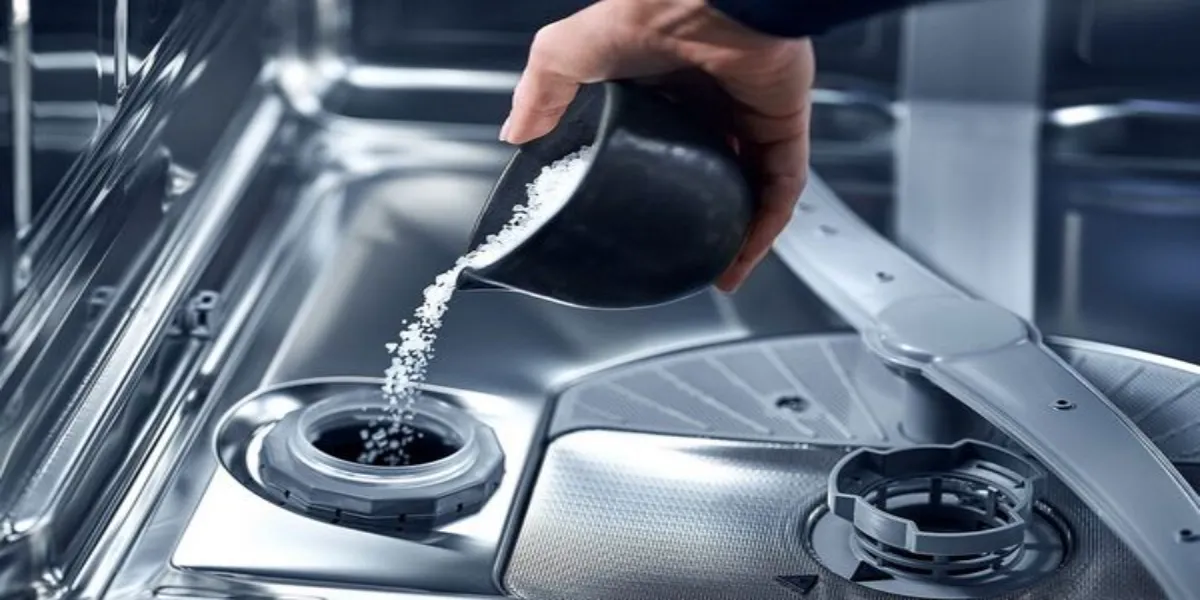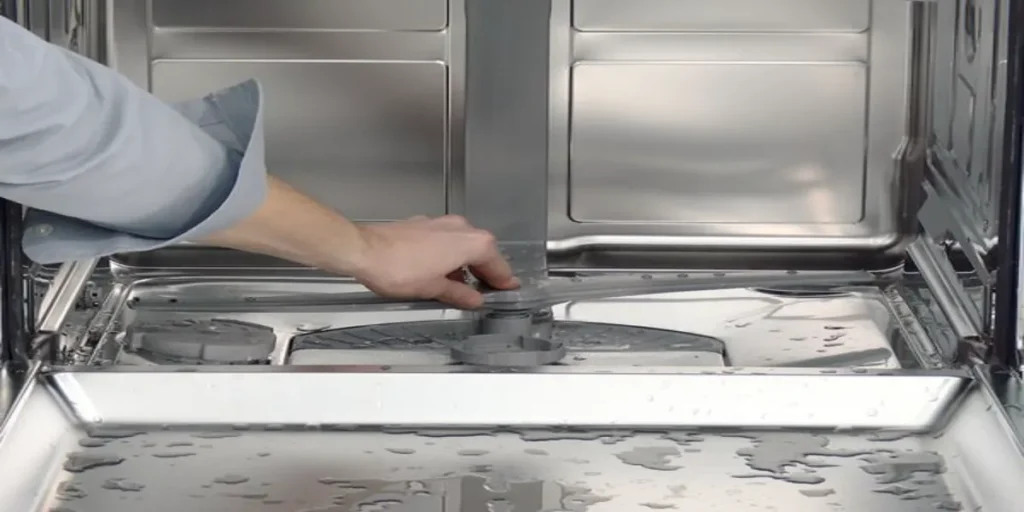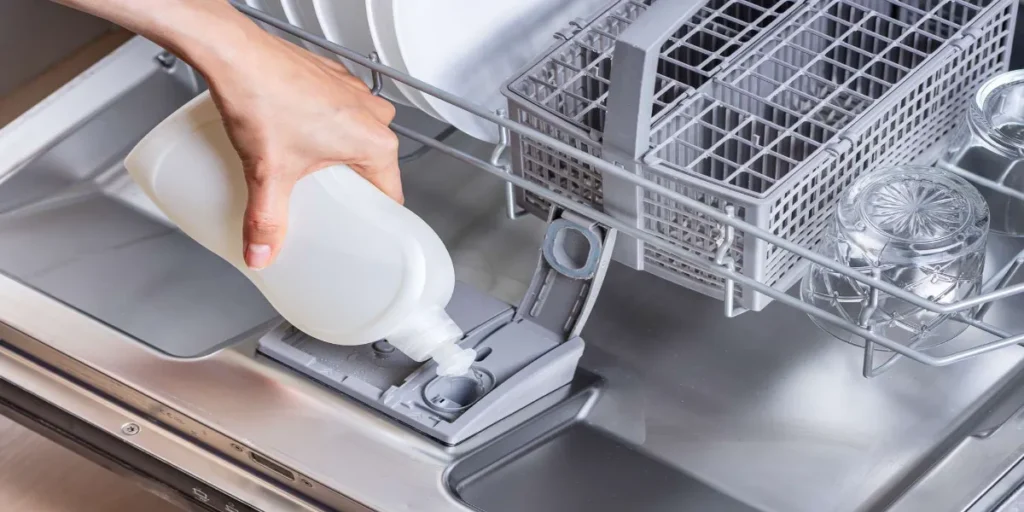Do you have a Bosch dishwasher that is not using salt? If so, you might be wondering why this is happening and how to fix it.
In this blog post, you will learn how to troubleshoot the common reasons your Bosch dishwasher doesn’t use salt.
Also, you will learn about alternative water softening solutions and maintenance tips.

Common Reasons Why Your Bosch Dishwasher Might Not Use Salt
There are several possible reasons why your Bosch dishwasher might not use salt. Here are some of the most common ones:
Water Softener Malfunction
Your Bosch dishwasher has a water softener system that uses salt to remove the hardness from the water.
The water softener has a sensor that detects the water hardness and adjusts the amount of salt accordingly.
If the sensor is faulty or dirty, it might not measure the water hardness correctly and use less salt than needed. This can result in limescale build-up and poor cleaning performance.
Incorrect Salt Settings
Your Bosch dishwasher has a salt setting that you can adjust according to the water hardness in your area.
You can find out the water hardness by using a test strip, checking your water bill, or contacting your water supplier. The salt setting ranges from 1 (softest) to 6 (hardest).
If you set the salt setting too low for your water hardness, your dishwasher might not use enough salt to soften the water.
Blockages and Clogs
Your Bosch dishwasher has a salt reservoir where you fill the salt. The salt reservoir has a cap that seals it and prevents water from entering.
The cap also has a small hole that allows air to escape when you fill the salt. Sometimes, the cap or the hole can get blocked or clogged by salt crystals or debris.
This can prevent the salt from dissolving properly and reaching the water softener.
Salt Reservoir Empty or Incorrectly Filled
Another simple reason why your Bosch dishwasher might not use salt is that the salt reservoir is empty or incorrectly filled. You should check the salt level regularly and refill it when it is low.
You should also use a special pitcher to pour the salt into the reservoir and avoid spilling it on other parts of the dishwasher.
You should only use coarse-grained dishwasher salt, not table salt or other types of salt.
Damaged or Faulty Components
Finally, your Bosch dishwasher might not use salt because of some damaged or faulty components.
For example, the water softener valve, the salt dispenser, or the control board might be broken or worn out. These components are responsible for regulating the flow of salt and water in the dishwasher.
If they are not working properly, they might affect the salt usage and performance of your dishwasher.
Step-by-Step Guide to Troubleshoot a Bosch Dishwasher Not Using Salt

Follow these steps to troubleshoot and fix a Bosch dishwasher not using salt:
Initial Checklist
Before you get deep into troubleshooting, let’s start with the basics. Make sure your dishwasher is plugged in and powered up.
Also, verify that you have adequate water pressure and that there’s no water leaking from the hose. Check if there’s sufficient detergent and rinse aid in the dispensers.
Take a glance at your dishwasher’s display panel as well. If you see any error codes or warning lights, note them down for reference.
Inspect the visible parts of the dishwasher for any signs of damage or wear. If everything checks out, you’re good to proceed to the next steps.
Inspecting the Salt Reservoir
The salt reservoir is usually located at the bottom of your Bosch dishwasher. Start by opening the dishwasher door and unscrewing the cap of the salt reservoir.
Once open, examine the salt levels. If it’s running low, now’s the time to refill it with dishwasher-specific, coarse-grained salt.
While you’re at it, check for any crystallized salt or debris around the cap or the opening of the reservoir. If you spot any, a damp cloth or a soft brush can work wonders in cleaning it up.
After you’ve filled the salt and cleaned the area, screw the cap back on securely. Run a quick rinse cycle to flush out any extra salt. If this doesn’t fix the issue, it’s time to dig deeper.
Checking the Water Softener
Now, let’s move to the water softener, usually located at the back of the tub. Inspect the water softener valve, the salt dispenser, and the sensor for any obvious signs of wear or damage.
Also, take a look at the electrical connections and wires. Ensure they’re intact and securely connected. If you see any limescale deposits or dirt on the sensor, wipe them off with a damp cloth or brush.
After you’ve done your inspection, it might be helpful to run a test cycle to evaluate if the water softener is functioning as it should.
If you discover any issues here, it might be time to call in a professional technician for repairs.
Verify Salt Settings on the Dishwasher
Lastly, you’ll want to make sure the salt settings on your dishwasher are set correctly.
On the control panel of your dishwasher, you should find a button that relates to the salt settings. Press and hold this button until the salt indicator light begins to flash.
Following this, tap the button to cycle through the numbers until your desired salt setting appears on the display panel. The right setting will depend on the hardness of the water in your area.
Once you’ve chosen the appropriate setting, press and hold the button once more until the indicator light stops flashing and the panel returns to its normal display.
Compare the salt setting number with the water hardness level in your area. You can use this table as a reference:
| Water Hardness Level | Water Hardness in °dH | Water Hardness in ppm | Salt Setting Number |
|---|---|---|---|
| Very Soft | 0 – 6 | 0 – 100 | 1 |
| Soft | 7 – 14 | 101 – 250 | 2 |
| Moderately Soft | 15 – 21 | 251 – 375 | 3 |
| Slightly Hard | 22 – 28 | 376 – 500 | 4 |
| Hard | 29 – 35 | 501 – 625 | 5 |
| Very Hard | >35 | >625 | 6 |
Alternative Solutions for Softening Water

You can try some alternative solutions for softening water in your Bosch dishwasher. Here are some of them:
Using Water Softener Tablets
Water softener tablets are similar to dishwasher tablets, but they also contain salt and other ingredients that help to soften water and prevent limescale build-up.
You can use them instead of or in addition to dishwasher salt. You just need to place one tablet in the detergent dispenser before each wash cycle.
Water softener tablets are easy to use and can improve your dishwasher performance and efficiency.
Vinegar as a Natural Alternative
Vinegar is a natural acid that can help to dissolve limescale and remove stains from your dishes and your dishwasher.
You can use white vinegar or apple cider vinegar as a natural alternative to dishwasher salt.
You just need to pour one cup of vinegar into the bottom of your dishwasher before each wash cycle. Vinegar is cheap and eco-friendly, but it might not be as effective as dishwasher salt in very hard water areas.
Commercial Rinse Aids
Commercial rinse aids are products that you can add to your dishwasher to improve its drying performance and prevent water spots on your dishes.
Some rinse aids also contain ingredients that help to soften water and prevent limescale build-up. You can use rinse aids instead of or in addition to dishwasher salt.
You just need to fill the rinse aid dispenser according to the instructions on the product label. Rinse aids are convenient and effective, but they might be more expensive than dishwasher salt.
Filtered Water Systems
Filtered water systems are devices that you can install in your home to filter out impurities and hardness from your tap water.
They can provide you with soft and clean water for your dishwasher and other appliances. Filtered water systems can eliminate the need for using dishwasher salt or other products to soften water.
Furthermore, they can enhance your health and save you money over time. Filtered water systems are costly and require regular maintenance.
Maintenance Tips to Prevent Future Salt Issues
To prevent future salt issues with your Bosch dishwasher, you should follow some maintenance tips. Here are some of them:
Regularly Check Salt Levels
You should check the salt level in your dishwasher regularly and refill it when it is low. You can use the salt indicator light on your control panel as a guide.
The light will turn on when the salt level is low and turn off when it is full. You should also check if there are any leaks or spills in the salt reservoir and clean them if necessary.
Keep the Salt Reservoir Clean
You should keep the salt reservoir clean and free from salt crystals or debris. You should also check if the cap and the hole are clean and not blocked or clogged.
You should clean the salt reservoir at least once a month or more often if you use a lot of salt.
Update Dishwasher Firmware
You should update the firmware of your dishwasher regularly to ensure that it has the latest features and bug fixes.
The firmware is the software that controls the functions and settings of your dishwasher.
You can update the firmware by connecting your dishwasher to the internet via Wi-Fi or Ethernet cable. The Bosch Home Connect app on your smartphone or tablet can also check for updates manually.
Periodic Professional Maintenance
You should have your dishwasher serviced by a professional technician at least once a year or more often if you notice any problems or issues.
A professional technician can inspect, clean, and repair your dishwasher and its components.
They can also advise you on how to optimize your dishwasher performance and efficiency.
FAQs on Bosch dishwashers not using salt
Is salt essential for my Bosch dishwasher to function properly?
Yes, salt is a critical component in a dishwasher’s water softening system.
How can I check if the salt reservoir in my Bosch dishwasher is empty?
To check if the salt reservoir is empty, refer to your dishwasher’s user manual to locate the salt compartment.
How often should I refill the salt reservoir in my Bosch dishwasher?
Generally, you may need to refill the salt reservoir every 1-2 months.
Can using the wrong type of salt affect my Bosch dishwasher’s performance?
Yes, using the wrong type of salt can impact your dishwasher’s performance.
Conclusion
Using salt in your Bosch dishwasher is important for softening water and preventing limescale build-up. Sometimes your dishwasher might not use salt properly due to various reasons.
You can troubleshoot and fix these problems by following the steps and tips in this blog post.
Alternative solutions and professional help are also available for softening water. By doing so, you can improve your dishwasher’s performance and extend its lifespan.

